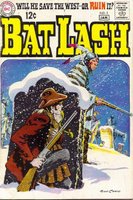Not so with Marvel's characters, and the Avengers demonstrated this as early as their second issue. Hank Pym's Ant-Man was replaced in this story by Hank Pym's Giant Man. In addition, the Hulk decided to leave the team.
By the third issue, Iron Man had exchanged his all-gold outfit for the gold and red combination which has mostly endured (with minor changes) to this day. And in the fourth issue.... well, let's just say that things changed for good.
The second issue featured the Space Phantom, a shape-shifter who could banish any human that he imitated to a place called limbo. He imitates all of the Avengers in turn, but eventually he makes the mistake of trying to mimic Thor, the Thunder God, and is banished to limbo himself as a result.
One oddity about Avengers #2 is that it contains an obvious boner. Rick Jones, who is shown living in the Southwest in both Avengers #1 and #3, appears on the streets of New York and confronts the Hulk (really the Space Phantom).
In Avengers #3, the Hulk teams up with the Submariner to fight the Avengers. Obviously this is a major comic, and yet it is dwarfed by the following issue.
Captain America returns! It is one of those interesting coincidences that in Fantastic Four #4, Stan Lee brought back the Submariner, a major Marvel character of the Golden Age, and in Avengers #4, Captain America, the biggest Marvel character of that era returned.

Cap helps the Avengers in another battle against the Submariner and in the end was offered and agreed to join the team. We learn that Bucky, Cap's sidekick, had died at the end of World War II, although we don't learn the identity of the man responsible for his death (yet). He seems interested in pursuing a friendship with Rick Jones much like that he'd had with Bucky back in the Golden Age.
Avengers #5 featured a pedestrian one-off battle with a former foe of the Mighty Thor, the Lava Men. But in Avengers #6, we first meet Baron Zemo, who is responsible for Bucky's death. He had been working on a super adhesive for Hitler's war machine when Captain America destroyed the factory. In the process, Zemo's mask, which he'd worn to prevent reprisals against him from the common folk, became permanently glued to his face.
Zemo returns in Avengers #7, this time assisted by the Enchantress and the Executioner, a pair of immortal villains who had previously appeared in a Thor story in Journey into Mystery. Banished from Asgard, they hook up with Zemo for different reasons. The Enchantress convinces Thor that the Avengers have gone bad and they are his enemy.
Up to this point, the Enchantress has seemed like a character caught between good and evil, much like other Marvel characters who eventually reformed. But we can sense the evil coming to the fore in this sequence:

Is this the first genuinely evil female in the Marvel universe? I can't think of another one.






No comments:
Post a Comment